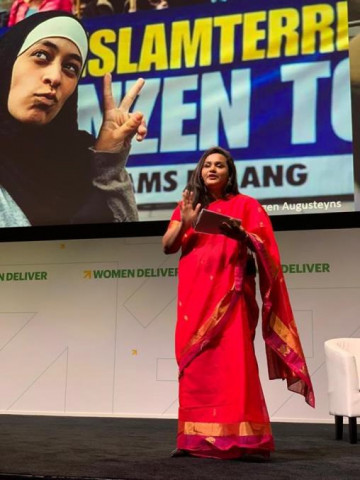
GCED Basic Search Form
Quick Search
You are here
News

The Women Deliver 2019 Conference was one step on the march towards a more gender equal world. With more than 8,000 people – including heads of states, ministers, parliamentarians, academics, advocates, activists and journalists - from over 165 countries on site and more than 100,000 people joining around the world through satellite events and the virtual conference - WD2019 connected advocates and decision makers, fuelled global and country-level action, and shone a global spotlight on the importance of gender equality. The new ideas, inspiration, and solutions shared at the conference will continue to inspire the world to harness power for good, demonstrate the power of gender equality, and catalyse investment in women-focused organisations and in sexual and reproductive health and rights.
WD2019 catalysed investment - financial, political, and programmatic - in genderequality, including women-focused organisations and Sexual and Reproductive Health and Rights (SRHR). Prime Minister if Canada, Justin Trudeau announced that the Government of Canada will raise its funding to CAD$1.4 billion annually to support women and girls’ health around the world. That includes an additional CAD$300 million a year dedicated to sexual and reproductive health rights, including access to safe abortion.
President of Kenya, Uhuru Kenyatta, committed to ending female genital mutilation by 2022, pushing for more women in parliament and power in general, ending child marriage, acting on climate change, and making primary and secondary education compulsory for all children, regardless of gender.
The Humanitarian Pre-Conference provided a unique forum for women-focused civil society organisations (CSOs) to directly advocate with donors and international organisations about the concrete actions needed to drive a more feminist and localised approach to humanitarian aid.
Partners unveiled new research and data that demonstrates the power of gender equality. McKinsey Global Institute released a report, The Future of Women at Work, which explores the impact of automation on the global workforce through a gender lens. The research found that navigating transitions will put women on a path to more productive, better-paid work and greater gender equality, but failing to do so could worsen existing challenges and widen gender disparities.
A new study was announced, conducted by the Population Council and with Women Deliver, found a strong and consistent lifelong negative association between giving birth before age 18 and a woman’s economic empowerment. This important research adds to the vital evidence base that investing in SRHR could have a positive economic impact.
Equal Measures 2030 launched The SDG Gender Index, the most comprehensive tool available to measure the state of gender equality aligned to the SDGs. Results from 129 countries measured by the Index show that the world is far from achieving gender equality, with 1.4 billion girls and women living in countries that get a “very poor” failing grade on gender equality.
Plan International released a new report that revealed that a vast majority of girls worldwide want to take leadership positions in the workplace, politics and wider society, yet more than 9 out of 10 believe as women leaders they will suffer widespread discrimination and sexual harassment.
WD2019 focused on ‘Power’, and addressed individual power, structural power, and the power of movements, and how power can drive – or hinder – progress and change. The conference challenged the power dynamics behind gender inequality, and demonstrated how we can all harness power for good.
The Women Deliver 2019 Conference acknowledged the barriers that are more entrenched for some girls and women than others – including indigenous populations, people with disabilities, the LGBTQIA+ community, refugees, and women of colour – and addressed those unique challenges.
Women Deliver laid out a vision for the powerful future of meaningful youth engagement in a new and ground-breaking policy paper.
Founders and leaders of some of the most influential movements of our time - Me Too, Times Up, Ni Una Menos, climate, labor unions, citizen journalism and others – shared a stage for the first time in history and found commonalities for the way ahead.
The Women Deliver Conference reinforced the global call to galvanize efforts to achieve gender equality as underscored in the Declaration on Gender Equality and Women’s Empowerment issued at the G7 Leaders’ Summit in Biarritz, France. The G7 leaders underlined commitment to “increase opportunities for at least 12 years of safe and quality education for all, particularly in emergencies and in conflict-affected and fragile states” and “to support eliminating gender inequality and discrimination, and countering gender biases and stereotypes and endeavour to work together with developing countries to promote inclusion, equity and access of girls and women to quality education, including access to Science, Technology, Engineering and Mathematics (STEM)”. They also recognised the importance of gender-responsive education and quality technical and vocational education and training (TVET).
More than 280 reporters, bloggers, and photographers from 63 countries attended the conference. The conference reached over 6.8 million people on social media.
URL:
http://aspbae.org/userfiles/sep19/others/ASPBAE_Bulletin_June_2019.pdf
